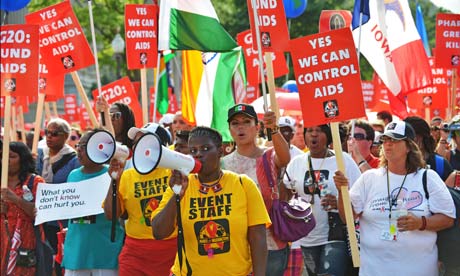
Aids activists gathering in Washington DC and Kolkata, India, this week have denounced conditions attached to US global Aids funding, which they say have damaged the response to the epidemic by further marginalising sex workers – among those hardest hit.
International organisations that receive funds through the President's emergency plan for Aids relief (Pepfar) must sign an "anti-prostitution pledge" prohibiting them from doing anything that could be perceived as supporting sex work. Activists say this has weakened the already underfunded response to the HIV epidemic among some of the most vulnerable communities.
"We need concerted pressure against the US to look into its anti-prostitution pledge and its relationship to HIV rates," said Andrew Hunter, president of the Asia-Pacific Network of Sex Workers. He said some organisations have rejected Pepfar funding because of the pledge, while others have closed entire programmes.
A key problem, said Hunter, is that the pledge affects all projects that are implemented by a grantee – regardless of whether or not a specific project receives money from the fund. This, combined with vague wording and uneven enforcement, has left many organisations unclear about which of their activities might be permitted or forbidden, he said.
Hunter said this confusion has led to "ridiculous levels of withholding services", as frontline staff worry about their programmes closing if they are perceived to be violating the pledge. "The pledge has ended up being far more damaging and applying to far more than even its most conservative supporters had wanted," he said.
The multibillion-dollar Pepfar initiative, launched by President George W Bush in 2003, funds HIV prevention, care and treatment in more than 150 countries. Most of the money goes to sub-Saharan Africa.
US organisations that receive Pepfar money are no longer bound by the pledge, after successfully taking the government to court on the basis that the conditions attached to funding violate first amendment rights. But organisations outside the US are still required to sign it.
"We can't even apply for Pepfar because we wouldn't sign the pledge," said Daisy Nakato, from Wonetha, a Ugandan human rights organisation founded by sex workers in 2008 to respond to abuse and violence against them by the police. Nakato argues that supporting sex workers and advocating their human rights is the key to improving their health, social and economic conditions.
Meena Seshu, head of Sangram, a community-based organisation in Maharashtra, India, said the Pepfar pledge adds "another layer of oppression" to the stigma and discrimination sex workers already face in daily life. In 2006, Sangram refused to sign the pledge and returned money it had received from Pepfar.
Around 200 organisations and individuals have signed a petition demanding that the US government repeals the pledge. The petition says the pledge has led to "the reduction or complete elimination of HIV prevention and treatment services for sex workers in numerous countries". "The US is preventing the delivery of successful health programmes and important resources to sex workers worldwide," it says.
Last month, the Global Commission on HIV and the Law said the pledge puts grantees in "an impossible bind: if they don't sign, they are denied the funds they need to control and combat HIV. If they sign, recipient organisations are barred from supporting sex workers in taking control over their own lives … including taking steps to avoid HIV and prevent its spread."
On Monday, the US secretary of state, Hillary Clinton, announced $37m (£24m) in new funding for initiatives that target vulnerable communities, such as sex workers and drug users, to achieve an "Aids-free generation". However, Clinton did not mention the US visa exclusion that prevented sex workers from attending the Washington conference and prompted an alternative summit in Kolkata to be convened.
"We can't afford to avoid sensitive conversations and we can't fail to reach those who are at highest risk," she said, pledging $2m for civil society activities, another $15m for research and $20m for country-led programmes.
Hunter said Clinton's comments were "too little too late", adding that these initiatives are a "drop in the ocean" compared with the changes activists are demanding. Beyond repeal of the anti-prostitution pledge, Hunter said the US government must realign its trade and global health priorities. In Vietnam, he said, the near exclusive use of patented drugs has led to long lists of people waiting to receive life-saving treatment.
According to the UN, less than 1% of global funding to prevent HIV and Aids is spent on sex workers, despite disproportionately high infection rates.

